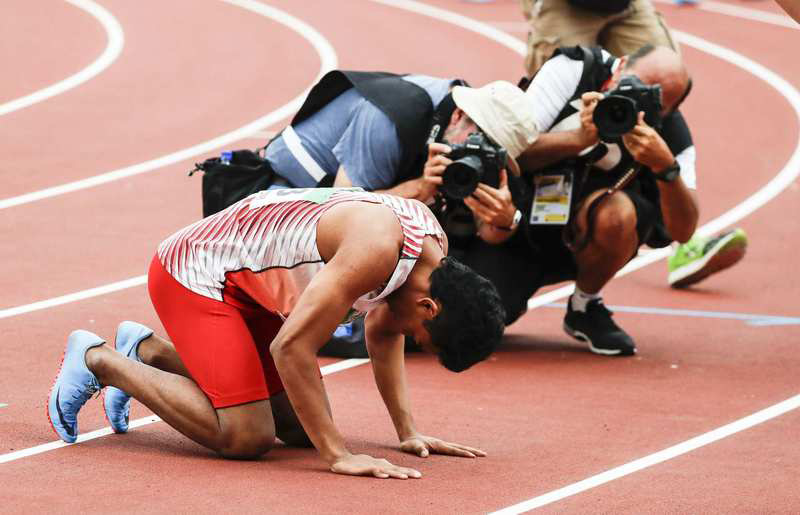JAKARTA, (Reuters) – Just over a year ago, Indonesian sprinter Lalu Muhammad Zohri could barely afford running shoes and was pretty much unknown outside his small village on the eastern island of Lombok.
That all changed in 10.18 seconds earlier this month when the 18-year-old orphan produced a blistering finish to beat the cream of the planet’s junior sprinting talent in the 100 metres final at the under-20 world championships in Finland.
Indonesia had never previously had a finalist at the championships, let alone a world junior champion, and Zohri has quickly become burdened with the hopes of a nation ahead of their hosting of the Asian Games.
Zohri’s sudden rise to the status of household name in the southeast Asian nation of some 260 million people is clearly still something of a shock to the quietly spoken teenager.
“It was beyond my imagination to be invited to meet the government, the ministers and the President,” he told Reuters during a break in his training at Jakarta’s Gelora Bung Karno Stadium.
“I feel very proud and thankful.”
Indonesia’s President Joko Widodo has praised Zohri as a “collective inspiration to the nation’s athletes to achieve gold” at the Asian Games and has ordered ministers to renovate his humble woven bamboo home.
The teenager, though, is not confident about his chances of winning another gold at the Asian Games, which will take place in Jakarta and Palembang from August 18 to September 2.
“I think (the Asian Games) will be tough because the competition is tight and I’m going against seniors who are more experienced and can finish the run under 10 seconds,” said Zohri, adding that his focus would be on preparing for the 2020 Tokyo Olympics.
Zohri lowered his personal best from 10.25 seconds in winning his world title in Tampere, leaving him only one hundredth of a second off Suryo Agung Wibowo’s Indonesia mark of 10.17.
To win gold in the 100 metres on the Gelora Bung Karno Stadium track next month, however, he is likely to have to beat Nigerian-born Qatari Femi Ogunade and Chinese sprinters Su Bingtian and Xie Zhenye, all of whom have run under 10 seconds.
“Lalu is a tough competitor. Given how fast he is running at 18, with training he has the capacities to break the 10-second barrier,” said U.S coach Harry Marra, who trained decathlon world record holder Ashton Eaton and is advising the Indonesia Athletics team.
Indonesia Athletics Association chairman Bob Hasan agrees, but is not sure the Asian Games is the right stage for such a fledgling talent.
“We are still deciding with Lalu’s coaches whether it might be better to have him run in the junior Asian Games,” Hasan told Reuters.
“He is still very young. We nearly didn’t get the visa for him to go to Finland. We had to provide him with a guarantee because his parents are no more.”
Hasan said Zohri, who lost his parents when he was a child, had struggled with the food in Finland, leading to the Indonesian Ambassador driving two hours a day to bring over rice and home cooked meals for him.
“BAREFOOT ON THE BEACH”
Zohri has already become an icon in his home village of Karang Pangsor where the sandy coastline provided him with his first training track.
“I ran barefoot on the beach, in the water with water up to my calves. I never wanted to give up,” he recalled.
A billboard celebrating his world title now adorns the entrance to the village, a triumph neighbours and relatives gathered in front of the family home to watch on TV. “From the beginning I saw that this boy is very agile and his posture and limbs are superior compared to his friends,” said Rosidah, the former sports teacher who discovered him.
“It was 2013, he wasn’t this tall, but I knew he had talent.”
Zohri’s eldest sister, Baiq Fazilah, proudly keeps all his medals and trophies in her home.
“He always keeps quiet and only tells me what he needs after I ask because doesn’t want to cause trouble,” she told Reuters.
His only request came in 2017 when he was invited to train with the national team and he asked his sister for a loan of 400,000 rupiah ($27.75) to buy some spikes.
Zohri’s success has made him the country’s most recognisable athlete and means he can command significantly more than that modest amount for endorsements.
As Indonesia Athletics’s business head Tigor Tanjung explained, these deals can sometimes cause Zohri some bewilderment.
“Air Asia said they want to sponsor him. I told Lalu this and he asked if they were sponsoring him to become a pilot,” he chuckled.
($1 = 14,415.0000 rupiah)









